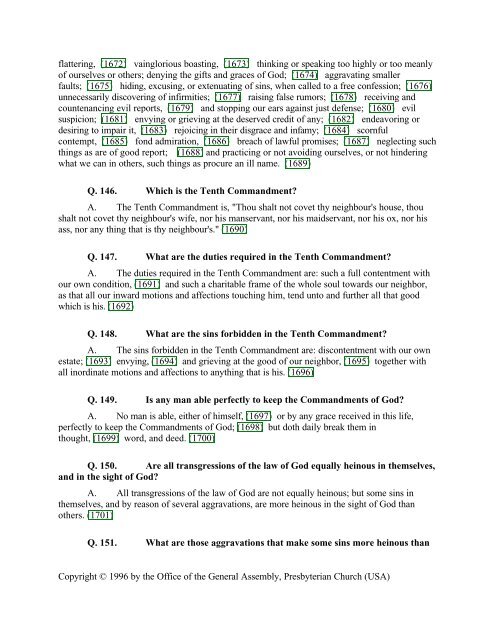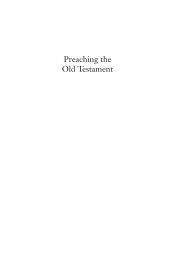- Page 1 and 2:
THE BOOK OF CONFESSIONS P R E S B Y
- Page 3 and 4:
Windows Version: ISBN 0-664-50008-0
- Page 5 and 6:
made clearer from time to time; it
- Page 7 and 8:
We do not doubt but that the selfsa
- Page 9 and 10:
warrant than the invention and opin
- Page 11 and 12:
and what Christ Jesus himself did a
- Page 13 and 14:
they should be ministered by lawful
- Page 15 and 16:
Christ Jesus, to whose glorified bo
- Page 17 and 18:
econciled to God? A. God wills that
- Page 19 and 20:
heaven and earth with all that is i
- Page 21 and 22:
Q. 39. Is there something more in h
- Page 23 and 24:
A. First, that, with the Father and
- Page 25 and 26:
Q. 67. Are both the Word and the Sa
- Page 27 and 28:
emembrance of me." For as often as
- Page 29 and 30:
grateful to God for his goodness an
- Page 31 and 32:
him only, and love, fear and honor
- Page 33 and 34:
Q. 108. What does the seventh comma
- Page 35 and 36:
Q. 120. Why has Christ commanded us
- Page 37 and 38:
churches; as also instruction in al
- Page 39 and 40:
we should not listen to the fathers
- Page 41 and 42:
more vivid impression on the behold
- Page 43 and 44:
Christi, cap. 8, "The Lord said, 'A
- Page 45 and 46:
DEATH. By death we understand not o
- Page 47 and 48:
invented them. OF WHAT KIND ARE THE
- Page 49 and 50:
that you may enter into heaven by t
- Page 51 and 52:
eing unimpaired and permanent. NOT
- Page 53 and 54:
"Abraham saw my day and was glad" (
- Page 55 and 56:
shall not depart from Judah . . . u
- Page 57 and 58:
And we do not doubt that they were
- Page 59 and 60:
PAPAL INDULGENCES. We especially co
- Page 61 and 62:
WHAT IS FAITH? Christian faith is n
- Page 63 and 64:
of a Christian. And as much as we c
- Page 65 and 66:
of the truth" (I Tim. 3:15). THE CH
- Page 67 and 68:
fellowship with the true Church of
- Page 69 and 70:
him who sent me" (John 13:20). Like
- Page 71 and 72:
yet by no means ignorant, simplicit
- Page 73 and 74:
the governing and preserving of the
- Page 75 and 76:
THE SACRAMENTS {ARE} ADDED TO THE W
- Page 77 and 78:
Lord's Supper, the outward sign is
- Page 79 and 80:
great favor God has shown to the ra
- Page 81 and 82:
neither did godly antiquity believe
- Page 83 and 84:
the Supper, we first examine oursel
- Page 85 and 86:
which wholly agree in prayer" (Hist
- Page 87 and 88:
long before us by those, as I suppo
- Page 89 and 90:
from the dead, and any sort of comm
- Page 91 and 92:
the Lord instituted marriages. More
- Page 93 and 94:
e praise and glory and thanksgiving
- Page 95 and 96:
10. The Supreme Judge, by which (47
- Page 97 and 98:
2. After God had made all other cre
- Page 99 and 100:
he hath been pleased to express by
- Page 101 and 102:
effectually apply and communicate t
- Page 103 and 104:
their minds, spiritually and saving
- Page 105 and 106:
1. The grace of faith, whereby the
- Page 107 and 108:
proceed not from a heart purified b
- Page 109 and 110:
5. The moral law doth forever bind
- Page 111 and 112:
conscionable hearing of the Word, i
- Page 113 and 114: and Sacraments; or the power of the
- Page 115 and 116: 2. The visible Church, which is als
- Page 117 and 118: the gospel, lawfully called thereun
- Page 119 and 120: 2. To these officers the keys of th
- Page 121 and 122: 1. The Holy Spirit, the third Perso
- Page 123 and 124: Q. 3. What do the Scriptures princi
- Page 125 and 126: everlasting life, (649) did enter i
- Page 127 and 128: justification, adoption, and sancti
- Page 129 and 130: Q. 53. Which is the Third Commandme
- Page 131 and 132: A. The Sixth Commandment requireth
- Page 133 and 134: in Jesus Christ, repentance unto li
- Page 135 and 136: Q. 100. What doth the preface of th
- Page 137 and 138: done in earth, as it is in heaven.
- Page 139 and 140: in time, (894) especially concernin
- Page 141 and 142: Q. 26. How is original sin conveyed
- Page 143 and 144: nature, perform obedience to the la
- Page 145 and 146: third day by his own power; (1039)
- Page 147 and 148: Q. 65. What special benefits do the
- Page 149 and 150: danger, (1134) but also of the filt
- Page 151 and 152: in torments and utter darkness; and
- Page 153 and 154: Q. 98. Wherein is the moral law sum
- Page 155 and 156: insensibleness under judgments, (12
- Page 157 and 158: profane, (1368) superstitious, (136
- Page 159 and 160: things at other times lawful; (1429
- Page 161 and 162: A. The reason annexed to the Fifth
- Page 163: sinful ways of taking or withholdin
- Page 167 and 168: A. It is required of those that hea
- Page 169 and 170: or under the bread and wine in the
- Page 171 and 172: worshiped with religious worship; (
- Page 173 and 174: Christ may be purely dispensed, and
- Page 175 and 176: unanimity the destruction of the Co
- Page 177 and 178: and with the same seriousness is he
- Page 179 and 180: authority of Jesus Christ, the Word
- Page 181 and 182: the Redeemer is the Lord and Creato
- Page 183 and 184: confident that he will continue to
- Page 185 and 186: when they profess none. 4. RECONCIL
- Page 187 and 188: entered upon his ministry of reconc
- Page 189 and 190: 22 and giving his life for the sins
- Page 191 and 192: 75 even as we watch for God's new h
- Page 193 and 194: the official texts of the confessio
- Page 195 and 196: frame a confession of faith. Six mi
- Page 197 and 198: church order and conflict, ministry
- Page 199 and 200: The Westminster Confession affirms
- Page 201 and 202: 44. (f) Ed. 1647 reads: "the vulgar
- Page 203 and 204: 78. 28. Rom. 11:33; Ps. 147:5. 79 2
- Page 205 and 206: 112 25. Rom. 2:8, 9; II Thess. 2:10
- Page 207 and 208: 144 20. Rom. 1:24, 26, 28; 11:7, 8;
- Page 209 and 210: 175 6. John 3:5-8; 6:37-44; Ezek. 3
- Page 211 and 212: 208 25. Matt., Chapters 26 and 27.
- Page 213 and 214: 237 2. Gen. 1:26. See under figure
- Page 215 and 216:
269 3. Phil. 3:9; Eph. 2:8; Acts 13
- Page 217 and 218:
303 6. I Thess. 5:23. 304 7. I John
- Page 219 and 220:
337 7. Titus 2:5; I Tim. 6:1; Titus
- Page 221 and 222:
369 9. Eph. 4:30. 370 10. Ps. 51:8,
- Page 223 and 224:
402 13. Gal. 3:24; Rom. 8:3, 4; Rom
- Page 225 and 226:
435 10. I John 5:14. 436 11. Ps. 47
- Page 227 and 228:
468 3. Deut. 6:13. 469 4. Jer. 5:7;
- Page 229 and 230:
then one Husband, at the same time.
- Page 231 and 232:
517 4. Matt. 13:47; Col. 1:13; Isa.
- Page 233 and 234:
549 1. Matt. 28:19. 550 2. Acts 2:4
- Page 235 and 236:
579 9. I Cor. 11:27, 29; I Cor. 10:
- Page 237 and 238:
609 (f) Added 1903. 610 For the pro
- Page 239 and 240:
643 1. Rom. 5:12, 19; I Cor. 15:22.
- Page 241 and 242:
677 1. John 1:12, 13; John 3:5, 6;
- Page 243 and 244:
711 1. Exod. 20:2. 712 1. Exod. 20:
- Page 245 and 246:
744 2. Ezek. 23:38. 745 3. Isa. 58:
- Page 247 and 248:
778 4. Prov. 14:5, 25. 779 1. Prov.
- Page 249 and 250:
812 6. Ps. 119:11. 813 7. Luke 8:15
- Page 251 and 252:
846 1. Ps. 119:35-36; Acts 21:14. 8
- Page 253 and 254:
876 6. Mal. 3:6; James 1:17. 877 7.
- Page 255 and 256:
910 4. Gen. 2:7; Matt. 10:28; Luke
- Page 257 and 258:
943 1. Gen. 3:8, 24. 944 2. Eph. 2:
- Page 259 and 260:
977 2. Matt. 28:19. 978 3. I Cor. 1
- Page 261 and 262:
1009 6. Rev. 22:12; Matt. 25:34-36;
- Page 263 and 264:
1043 8. Rom. 14:9. 1044 9. I Cor. 1
- Page 265 and 266:
1077 2. I Cor. 1:21; Rom. 1:18-32;
- Page 267 and 268:
1110 4. Rom. 5:1; Acts 10:43; Gal.
- Page 269 and 270:
1144 5. Rom. 6:6, 14. 1145 6. Rom.
- Page 271 and 272:
1178 3. I Thess. 4:14. 1179 4. Rom.
- Page 273 and 274:
1211 2. Gal. 3:24. 1212 3. Rom. 1:2
- Page 275 and 276:
1241 7. Ps. 18:1, 2. 1242 8. Mal. 1
- Page 277 and 278:
1274 16. Heb. 3:12. 1275 17. Gal. 5
- Page 279 and 280:
1307 3. Deut. 17:18, 19; Acts 15:21
- Page 281 and 282:
1341 1. Exod. 20:5, 6. 1342 2. Exod
- Page 283 and 284:
1375 11. Rom. 12:14; I Sam. 17:43;
- Page 285 and 286:
1409 2. Gen. 2:3; Luke 23:56. 1410
- Page 287 and 288:
1442 1. Eph. 5:21; I Peter 2:17; Ro
- Page 289 and 290:
1476 13. Titus 2:15. 1477 1. Ezek.
- Page 291 and 292:
1510 9. Luke 21:19; James 5:8; Heb.
- Page 293 and 294:
1544 18. Gal. 5:15. 1545 19. Num. 3
- Page 295 and 296:
1578 18. Eph. 5:11; Prov. 5:8. 1579
- Page 297 and 298:
1612 18. James 5:4; Prov. 21:6. 161
- Page 299 and 300:
1646 3. Prov. 19:5; Prov. 6:16, 19.
- Page 301 and 302:
1680 37. Acts 7:57. 1681 38. I Cor.
- Page 303 and 304:
1714 13. Heb. 6:4-6; Heb. 10:29; Ma
- Page 305 and 306:
1748 47. Prov. 7:14, 15. 1749 48. N
- Page 307 and 308:
1782 10. Ps. 119:18; Luke 24:45. 17
- Page 309 and 310:
1816 2. Rom. 4:11; I Cor. 11:24, 25
- Page 311 and 312:
1848 1. The specifications enumerat
- Page 313 and 314:
1882 7. Gal. 2:20; John 6:35. 1883
- Page 315 and 316:
1914 2. Ps. 65:2. 1915 3. Micah 7:1
- Page 317 and 318:
1948 9. Heb. 10:22; James 1:6. 1949
- Page 319 and 320:
1982 4. II Thess. 3:1. 1983 5. Rom.
- Page 321 and 322:
2016 8. James 4:3. 2017 9. Gen. 28:
- Page 323 and 324:
2050 22. I Thess. 5:23. 2051 1. Mat
- Page 325 and 326:
"The Fulfillment of Reconciliation,
- Page 327 and 328:
2067 Lines 2-6: Scripture: Ex 20:3-
- Page 329 and 330:
Rom 13:8-10; 1 Cor 8; 1 Jn 2:3-11.
- Page 331 and 332:
Mic 3:5-8; Mk 12:35-37; Jn 20:19-23
- Page 333:
WLC, qq 67, 196; BD, II, 2; C67, IB




